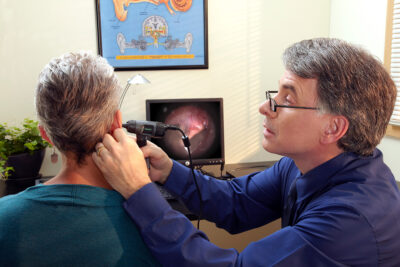Communicating with the Deaf and Hearing Impaired
 This blog is a piece by Michelle Friedman about tips for helping hearing practitioners communicate to those with hearing loss in the medical field. Friedman is mom to an adorable little boy who is hearing impaired, and serves as the Director of Marketing at an online medical scrubs retailer, Medical Scrubs Collection. The blog originally appeared on Medical Scrubs Collection’s blog.
This blog is a piece by Michelle Friedman about tips for helping hearing practitioners communicate to those with hearing loss in the medical field. Friedman is mom to an adorable little boy who is hearing impaired, and serves as the Director of Marketing at an online medical scrubs retailer, Medical Scrubs Collection. The blog originally appeared on Medical Scrubs Collection’s blog.
I am a communicator. I love to teach and to explain, and writing is my passion. So it was the ultimate irony when my child was diagnosed with severe hearing loss, and it opened my eyes to a whole new world. You learn to expect a certain degree of difficulty when communicating in certain settings, but the one place we want to feel safe and understood is in the healthcare environment. It is important for healthcare providers to build a bond of trust with their patients, and it is nearly impossible to do so when there is a breach of communication. Below is a list of tips for healthcare professionals when dealing with those who are deaf or hard of hearing.
- Speak clearly and articulate well, without shouting
Face the hearing impaired person directly and speak clearly, enunciating your words well. Keep your hands away from your face while speaking, and refrain from eating, smoking, or other activities that involve the mouth. There is a fine line between clear speech, and shouting or speaking in a condescending way. Be careful not to shout or speak to the patient as if they are intellectually challenged. - Check that assistive listening devices are working
If you are familiar with the patient and you feel that they are not understanding you as well as they usually do, ask for permission to check their assistive listening devices to ensure that they are working properly. This is usually only necessary for the elderly or pediatric patients. - Try to minimize background noise
Hearing aids’ biggest shortcomings are their difficulty in filtering environmental noise. Try to take the patient into a quiet room when speaking to them, and minimize background noise as much as possible. Turn off background music, move away from a vacuum cleaner, or shut off a noisy air conditioner. - Ensure comprehension
Make sure that your patient understands what is being discussed by rephrasing your sentences a few ways, and asking questions related to the topic at hand. It is also helpful to provide context to the conversation by introducing a topic so that the patient has an easier time figuring out which words they missed if they only heard part of what you’ve said. Have your patient repeat specifics such as dosage amounts or phone numbers back to you to ensure comprehension. Many numbers and words sound alike. This is especially important when dealing with drug prescriptions and treatment plans. Many times there are cases of noncompliance simply because the patient did not understand the instructions. - Body language is important
Many of the deaf and hard of hearing are used to sign language, and use their body language well. Pay attention to the listener. If you see a puzzled look or body language that conveys that they are uncomfortable ask if they would like you to explain again, or if they have questions. If available, a sign language interpreter can go a long way toward helping relax your patient, and achieving a more productive relationship. - Write it down
Whenever possible, give written instructions so that your patient is clear on the topic matter and can review it later. Write down pertinent websites, phone numbers, schedules, and other useful information that may not be on the standard post-visit report. - Respect your patient
Deaf or hard of hearing patients may bring along to their appointments a patient advocate, interpreter, or relative. While it may be more comfortable for you to communicate directly with the companion, show respect to your patient. Don’t talk above them, or about them, as if they are not in the room. Speak directly to your patient, and use the support as a means of ensuring complete comprehension.
For tips on how to communicate with your loved one who suffers from hearing loss, contact your hearing professional.
